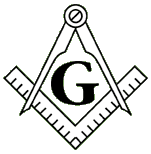
Was Freemasonry an influencing factor during the Texas Revolution?
November 1999
![]()

Was Freemasonry an influencing factor during the Texas Revolution?
November 1999
![]()
From: Rev. Robert W. Moore
Date: 11/28/99
I do not believe Freemasonary was part of the Texas Revolution! I have studed this battle for thirty years and have never come across such.
![]()
From:
Wallace McKeehan
Date:
11/ 28/99
Warring between free masonry factions along political lines in the newly independent Mexican Republic and meddling in the scrabbles for political interests by first US Mexican envoy, Joel Poinsett, may debatably have very indirectly contributed to the first two of three causes which led to the Texas Revolution of 1835-6, as briefly stated by Anglo-Mexican immigrant Col. James Bowie:
1. Jealousy of Mexicans regarding the intentions of the people of the United States, and a belief that, a design to despoil Mexico of Texas was contemplated, and had the secret aid of the American government.
2. The feelings engendered by these opinions caused Mexican officials to look upon the actions of the American residents of Texas, with suspicion, and ended in treating them unjustly and oppressively.
More interesting is if there is merit to stories related by old Texians like DeWitt colonist Creed Taylor and Joseph Lawrence , and other patriots as Antonio Menchaca. Creed Taylor relates:
The scouting party that captured Santa Anna was composed of Joel W. Robinson, A. H. Miles, Charles P. Thompson, Joseph Vermillion, and Siron R. Bostick, led by Color Sgt. James A. Sylvester, the gallant young man who bore the "Liberty or Death" flag through the Battle of San Jacinto, the only flag flown on the field by the Texans that day. In flushing the vicinity near Vince's Bayou, the Mexican general was discovered crouching in the tall grass along a small hollow. He was first sighted by Jim Sylvester who suddenly rode upon the fugitive. The Mexican had on a corporal's uniform and was barefooted. Sylvester at once signaled his men scattered around some four or five hundred yards away, and as they began dashing up and flourishing their guns, Santa Anna became excited, and it was at that moment that he first gave the Masonic sign of distress. Both Sylvester and Robinson were Masons and they understood what "them funny motions meant," and this no doubt accounts for the fact that the captive was not killed on the spot.
If these stories have merit, then the masonry brotherhood may have saved El Presidente from immediate or post-capture execution for which there was significant pressure. Arguably, execution of the dictator may have changed the course and timetable of independence and relative peace and painted the Texian freedom fighters as no more humane than their Centralista enemies.
There are other reports of use of the Masonic bond to spare execution or gain favors in actions in the Texas war of independence. A description of an event in Texas by W.P. Zuber mentions a role of Masonic membership as early as 1827:
It has often been said that no Free Mason can be lawfully punished for crime if the power of conviction or pardon rests in one or more members of the fraternity. All intelligent Free Masons know this to be false; but in cases of purely political offense, Masonry has frequently been the means of saving life. Mr. Sterne being a Mason of high degree, his Masonic friends in New Orleans interceded for him through the agency of General Terán, who was also a Mason of high rank, and Terán procured his pardon. But his liberation was on parole not again to bear arms against the Mexican government, nor to aid its enernies. [Adolphus Sterne, a Mason of Jewish descent, was a Nacogdoches resident who participated in the Fredonian Rebellion who, in contrast to most, was not released after the affair because of supplying arms to the rebels]
Almaron Dickinson is said to have left his Masonic apron with wife Susannah and instructed her to display it appropriately if it would aid her survival assuming she were spared in the Alamo assault. There are instances where the masonry brotherhood is said to have fostered cooperation between Anglo and Hispanic Texians prior to independence in gaining favorable political conditions for settlement through colonization.
Wallace L. McKeehan